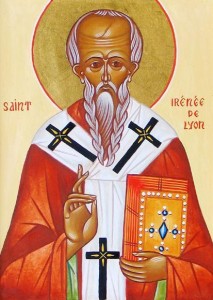 Irenaeus was a brilliant 2nd century churchman and bishop of Lyon whose major contribution to the Church is his five-book-work, Against Heresies. Book I is a dizzying and seemingly exhaustive account of the false teachings of the gnostics, particularly of Valentinianism. Irenaeus researched and wrote the book in order to provide the Church a clear understanding and refutation of the gnostic heresies.
Irenaeus was a brilliant 2nd century churchman and bishop of Lyon whose major contribution to the Church is his five-book-work, Against Heresies. Book I is a dizzying and seemingly exhaustive account of the false teachings of the gnostics, particularly of Valentinianism. Irenaeus researched and wrote the book in order to provide the Church a clear understanding and refutation of the gnostic heresies.
Throughout Book I, Irenaeus essentially lets the gnostics speak for themselves. Again, it is astonishing the amount of detail he provides in doing this. The reader may find himself growing numb at the long descriptions of gnostic eisegesis, numerology, mythology, and symbolism. Irenaeus is nearly encyclopedic in his chronicle, and the thoroughness with which he approached his task cannot help but impress.
I was struck throughout by a sense of the importance of Irenaeus’ example for Christian apologists and, indeed, for all Christians today. He does not appear to be attempting to caricature his opponents, whether or not his descriptions were completely accurate. He provides more than ample space for his description of their views. This, it seems to me, is admirable. The work does not read like a modern hatchet job. It reads almost like a dispassionate description (in his descriptions of the gnostic beliefs, anyway), though it is anything but. Even so, here we find a model for the quality of effort we should make to understand that about which we are speaking.
In contrast to the gnostic heresies, Irenaeus makes some powerful statements about Christian truth and offers some notable summaries of such. For instance:
The Church, though dispersed through our the whole world, even to the ends of the earth, has received from the apostles and their disciples this faith: [She believes] in one God, the Father Almighty, Maker of heaven, and earth, and the sea, and all things that are in them; and in one Christ Jesus, the Son of God, who became incarnate for our salvation; and in the Holy Spirit, who proclaimed through the prophets the dispensations of God, and the advents, and the birth from a virgin, and the passion, and the resurrection from the dead, and the ascension into heaven in the flesh of the beloved Christ Jesus, our Lord, and His [future] manifestation from heaven in the glory of the Father “to gather all things in one,” and to raise up anew all flesh of the whole human race, in order that to Christ Jesus, our Lord, and God, and Saviour, and King, according to the will of the invisible Father, “every knee should bow, of things in heaven, and things in earth, and things under the earth, and that every tongue should confess” to Him, and that He should execute just judgment towards all; that He may send “spiritual wickednesses,” and the angels who transgressed and became apostates, together with the ungodly, and unrighteous, and wicked, and profane among men, into everlasting fire; but may, in the exercise of His grace, confer immortality on the righteous, and holy, and those who have kept His commandments, and have persevered in His love, some from the beginning [of their Christian course], and others from [the date of] their repentance, and may surround them with everlasting glory.
[The Church Fathers (2014-06-12). The Complete Ante-Nicene & Nicene and Post-Nicene Church Fathers Collection (Kindle Locations 11938-11949). Catholic Way Publishing. Kindle Edition.]
Furthermore, I was struck by Irenaeus’ strong biblicism. Here is one of his criticisms of the gnostics: “They gather their views from other sources than the Scriptures” (Kindle Location 11792). Furthermore, Book I is replete with biblical citations as well as examples of passages that the gnostics twist to their own ends.
I suppose what I found most refreshing and convicting, however, was Irenaeus’ conviction that Christianity does have a doctrinal core and content that is not open to editing. On this basis, he confidently argues for an existing catholicity of doctrine around the world.
For the Churches which have been planted in Germany do not believe or hand down anything different, nor do those in Spain, nor those in Gaul, nor those in the East, nor those in Egypt, nor those in Libya, nor those which have been established in the central regions of the world. But as the sun, that creature of God, is one and the same throughout the whole world, so also the preaching of the truth shineth everywhere, and enlightens all men that are willing to come to a knowledge of the truth (Kindle Locations 11953-11956).
In a day in which the very definition of Christianity is consistently undermined by those who appear to believe that the word “Christian” means whatever a given individual or group wants it to mean, it is refreshing to see such a clear and robust defense of the idea of the faith once for all delivered to the saints.
Finally, one cannot help but be struck by the courage and passion of Irenaeus himself. Simply put, one would not want to be on the receiving end of his critical attention. Irenaeus clearly had a deep, abiding love for the truth of the gospel and felt a personal responsibility to stop the spread of heresies in the life of the Church. As such, he stands even today as a champion of biblical, orthodox belief.
